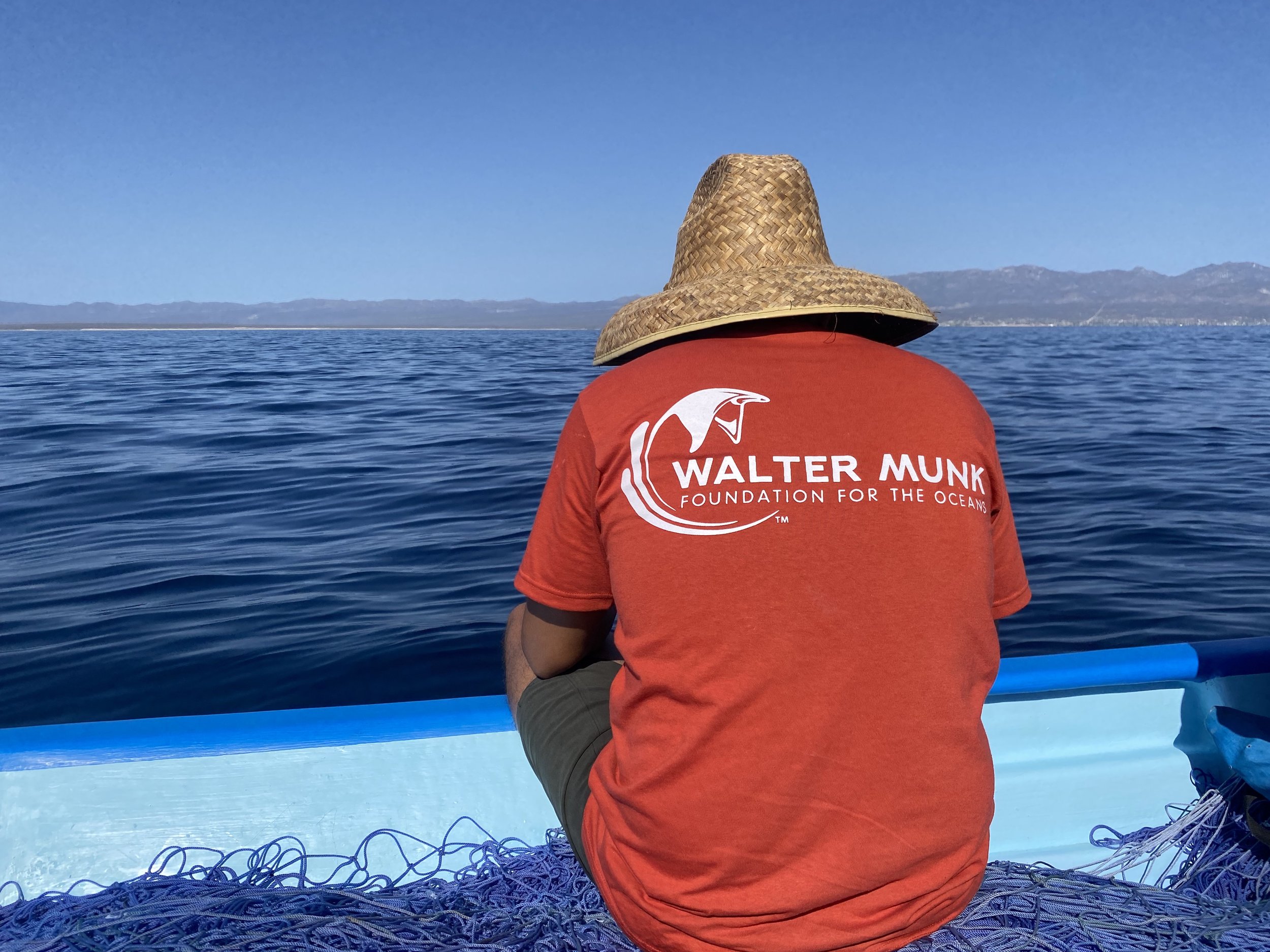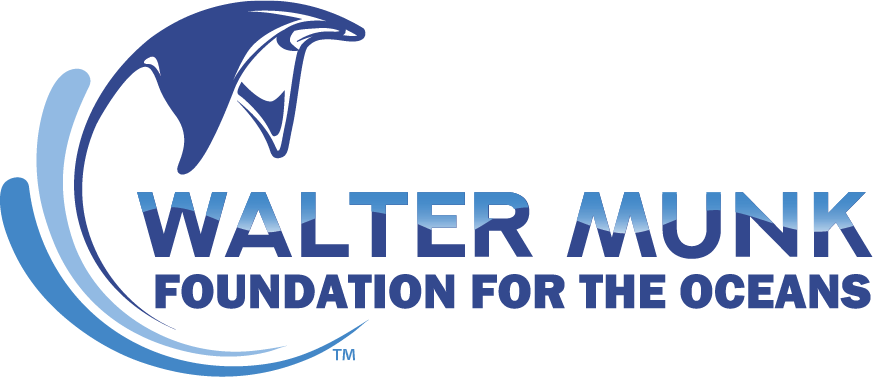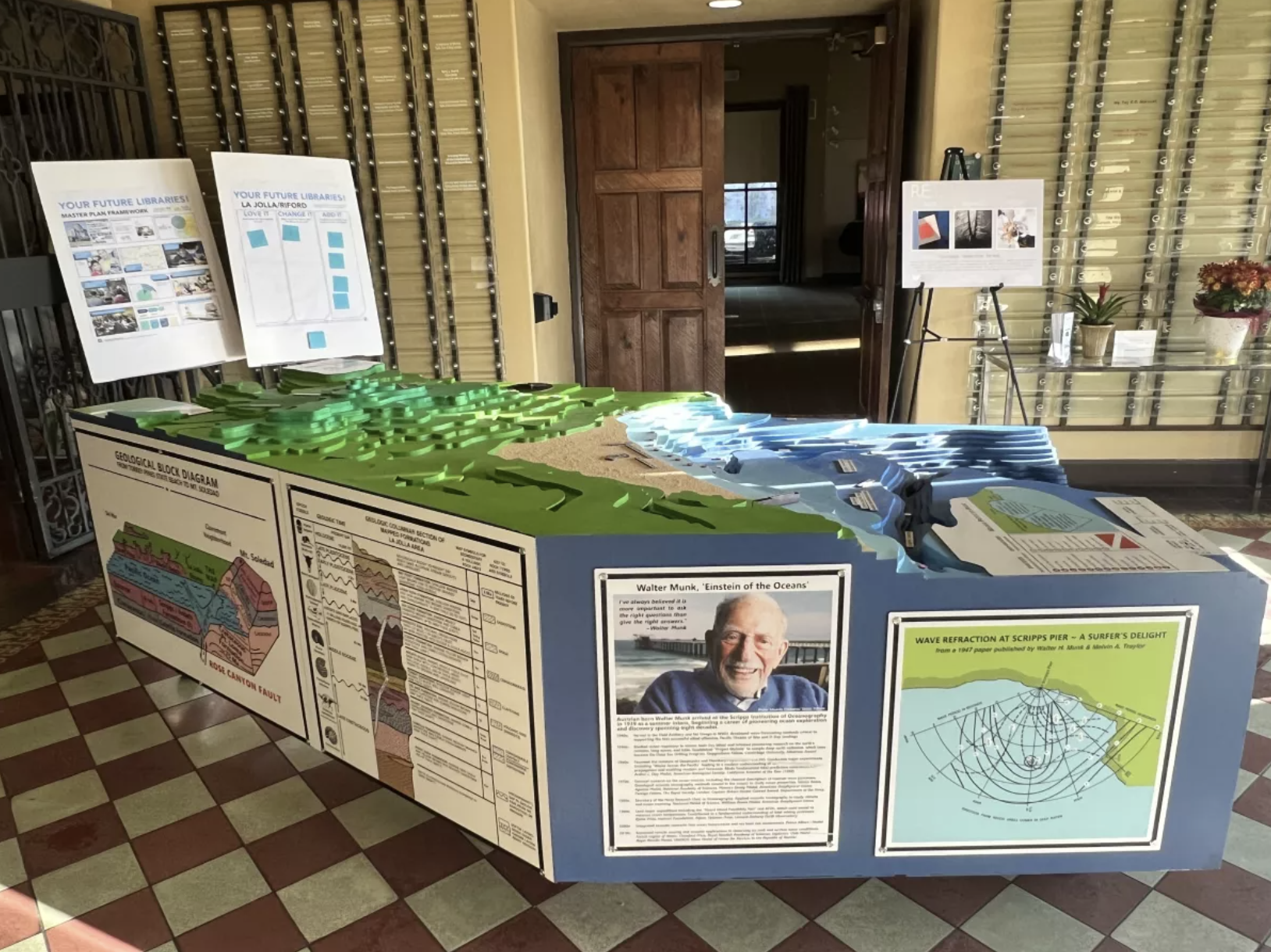The Walter Munk Foundation for the Oceans
It's important that you work on things that you care about and do a good job and not be too worried about consequences. Don't be afraid to get involved.
—Walter Munk
Based in La Jolla, California and established in 2017, The Walter Munk Foundation for the Oceans was founded by Walter and Mary Munk to continue Walter's legacy of daring exploration and discovery in the field of oceanography.
Through the Foundation, Walter Munk established partnerships with leading researchers in Baja California, Mexico working to understand and protect the vulnerable M. munkiana species of ray — named after Walter. Walter and Mary also selected Lake Altaussee, Austria to begin comprehensive long-term studies with leading Austrian researchers about the lake’s history, geology, ecology and response to climate change.
Following Walter’s death in 2019 at the age of 101, the scientists and educators at WMFO continue Walter's legacy of education and outreach. Today the Walter Munk Foundation for the Ocean supports the enduring programs Walter and Mary started, with a renewed focus for developing engaging, exciting and impactful ocean science and education initiatives. Join us!
History
Volunteer Opportunities
We encourage the participation of volunteers who support our mission in continuing Walter Munk's legacy of daring exploration and discovery through scientific research, education, and ocean conservation.
If you are interested in volunteering, click the button below to complete and submit a volunteer information form. If you have any questions, please send us a message using our contact form or email us at info@waltermunkfoundation.org.

Foundation Board
Mary Coakley Munk
President
Paula Selby
Treasurer
Phil McGillivary, Ph.D.
Secretary
Dimitri Deheyn, Ph.D.
Board Member
Abigail Jones
Development Director
George Orbelian
Board Member
Chris Verlinden, Ph.D.
Board Member
-
President
Mary Coakley Munk is a founding Board Member of the Walter Munk Foundation for the Oceans. She has been active in the local community and served on numerous boards and committees since she moved to La Jolla Shores in 2000. She is the founder and President of Friends of La Jolla Shores, a non-profit whose mission is to enhance and preserve our public parks, beaches, unique coastal community, and marine environment while promoting related educational experiences and recreational activities.
The organization has designed, funded, and overseen construction of over $2M worth of improvements in Kellogg Park, including a 2,200 square foot lithomosaic plaza depicting “THE MAP® of the La Jolla Underwater Park & Ecological Reserves;” a life-sized bronze sculpture by D. Lynn Reeves of “J.J. the Orphaned Baby Gray Whale;” and a Junior Lifeguard themed playground, all focused on educating the park’s millions of visitors to become better stewards of their environment. Mary has shared the better part of the last decade with Walter and wishes to honor his lifetime of daring exploration and discovery by supporting scientific research, education, and ocean conservation through the Foundation.
-
Treasurer
Paula Selby has been employed by Kaiser Permanente since 1988 and currently works as a Senior Procurement Manager for the healthcare organization’s National Supply Chain Operations. Paula became a certified diver in 1969 and worked as a diving instructor, divemaster and resort manager in her hometown of Columbus, Ohio, the Bahamas and the Caribbean before moving to San Diego in 1988. Her long-time passion for the ocean, diving and underwater photography continue to fuel an interest in worldwide travel and marine conservation. Paula is also a Board Member Catalina Channel Swimming Federation which sanctions marathon swims across the Catalina Channel. In addition to underwater photography, she enjoys open water swimming and graphic art.
-
Abigail’s love for the ocean began at age five, when she wrote her first book on dolphins and whales and called book publishers to insist that they publish her work. She became an official member of the American Cetacean Society soon after. As a young girl in Minnesota, Abigail was enamored with the ocean and dreamed of a day when she could swim with the majestic creatures she studied so intensely. So, it was no surprise that she attended UC San Diego, where she could freely swim around Scripps Pier with friends in between classes. She surrounded herself with international friends from Scripps Institute of Oceanography, and because of her shared deep love for marine life and ocean conservation, she was invited to move in as an honorary guest to a historic house in Windnsea, La Jolla, that’s dedicated to housing people from around the world who are committed to working on behalf of the ocean.
Abigail met Mary Munk and the Foundation team at a Women’s Freediving and Leadership event in the Fall of 2023. Mary shared that the Foundation partnered with underserved communities in San Diego to provide outdoor science educational field trips. Given that Abigail spent seven years researching educational programs for underserved San Diego communities with UCSD at the start of her career and ran an outdoor leadership development company for business executives for five years, both Mary and Abigail felt immediate synchronicity and need to collaborate. Abigail accepted the offer to serve as a part-time Executive Director for the Foundation starting in January 2024.
-
Board Member
Dimitri Deheyn is a Scripps marine biologist developing research in the field of biomimicry: the process of emulating Nature to support green and sustainable innovations for various industries. His research aims at understanding the fundamental mechanisms responsible for specific adaptations organisms have developed to thrive under particular conditions, in aquatic or terrestrial environments. The findings can then be used for biotechnological, biomedical and/or bioengineering applications, thus improving societal needs through biomimicry, or bioinspiration. Inherently, his research covers a broad range of topics, including UV-protection, bioadhesion/anti-biofouling, biophotonics and biomaterials with unusual combination of properties. His research also relates to “living light”, the production of light through bioluminescence (visible light produced following a chemical reaction) or through fluorescence (visible light produced following excitation with a blue or black light), but also through structural coloration and iridescence (visible coloration from “filtering or manipulating” sunlight). Change in living lights can then be used as reporter for biosensing. All these biological properties are at the intersect with material science and bioengineering, making Deheyn’s expertise cross-disciplinary and bridging the gap between academia and industry, for which he founded the BEST Initiative (Biomimicry for Emerging Science and Technology)
Deheyn earned his Ph.D. on fundamental and applied aspects of bioluminescence in 1998, from the Free Thinking University of Brussels (ULB), Belgium. In 1999, he moved to Scripps Institution of Oceanography where he is now an Associate Research Scientist, to work on the applications of living lights, and to a broader sense biomimicry.
-
Board Member
George Orbelian is a husband (Marcia), parent of twins (Craig and Wade), artist / creative, lifelong motorcyclist (current bike: Yamaha R1M) with expertise in both building competition motorcycles and experience in racing motorcycles, masters swimmer, lifelong surfer (San Francisco Ocean Beach + Hawaii and other locations around the world), surfboard design expert, author (ESSENTIAL SURFING), former Surfboard Design Editor for SURFER Magazine, real estate owner / manager (Orbelian Holdings, L.P.), environmentalist (Co-founder or Project Kaisei which funded Scripps Institution of Oceanography SEAPLEX research with Miriam Goldstein Ph.D. and received Google Earth Hero recognition, worked with The Quiksilver In Memory of Eddie Aikau Big Wave Invitational with Contest Director George Downing, is a technology entrepreneur (lead investor in Ojingo Labs, Inc.) and is a member of the board of the Buckminster Fuller Institute.
George is interested in identifying and sharing comprehensive solutions that allow us to regenerate the eco systems that sustain all life on this planet. George is fluent in Russian, and is continually learning how we can use innovations in science, engineering and technology to empower individuals with knowledge of a regenerative future so that we can live on this planet in the way envisioned by Buckminster Fuller, “Make the world work, for 100% of humanity, in the shortest possible time, through spontaneous cooperation, without ecological offense or the disadvantage of anyone.”
-
Secretary
As Science Liaison for Coast Guard PACAREA, Dr. Phil McGillivary coordinates science issues for the Coast Guard for the Pacific Ocean in conjunction with Coast Guard Headquarters and the Coast Guard Research & Development Center. His responsibilities include management of science conducted using Coast Guard aircraft, buoytenders, and other assets, as well as high latitude science conducted on icebreakers managed by the Coast Guard. In addition to his CG duties, in fall 2022 he was appointed Chief Scientist for Arctic Security for the Office of Naval Research International Collaborative Engagement Program for Polar Research (ICE-PPR) focused on high latitude communications and non-GPS positioning. He previously worked in the Office of Secretary of Defense after a post-doc at NOAA in Monterey, California through a joint appointment with the Naval Postgraduate School, coordinating research on radars, acoustics and lasers. An earlier post-doc at the Marine Science Institute of the University of California, Santa Barbara dealt with carbon flux in the ocean. His 1988 doctorate in Ecology from the University of Georgia on biogeochemical fluxes at fronts along the Gulf Stream followed three years employment at the NOAA Atlantic Oceanographic & Meteorological Laboratory (AOML) in Miami, Florida. His experience includes two years at sea on research vessels and submersibles and studies in traditional maritime knowledge from cultures across the Pacific and in Alaska.
-
Board Member
Dr. Chris Verlinden has extensive military experience, drawing from a 14-year career as an officer in the U.S. Coast Guard. He has worked with the Office of Naval Research and Naval Research Laboratories extensively on projects ranging from seismic exploration to ocean acoustics and signal processing. Specifically, Dr. Verlinden is a subject matter expert in the use of large vertical aperture arrays (LVAs), and making environmental inferences using passive and source of opportunity acoustic noise. He graduated from the Coast Guard Academy with high honors with a degree in Marine and Environmental Sciences in 2008, whereupon he was stationed aboard the Coast Guard Icebreaker Polar Sea as the Science Officer for two years. Research missions while serving aboard Polar Sea ranged from methane hydrate research to capturing polar bears. In 2010, Dr. Verlinden transferred to USCGC Sycamore out of Cordova, Alaska where he served as Operations Officer for two years.
During this time, Dr. Verlinden served as task force leader for on-scene Coast Guard assets during the Deepwater Horizon oil spill, and as project officer for oil spill response exercises in support of Operation Arctic Shield, earning five arctic service medals in the process. Dr. Verlinden completed his graduate work at Scripps Institution of Oceanography earning an M.S. in Oceanography in 2014 with research focusing on passive ocean acoustics and the information content of ocean noise. Dr. Verlinden holds numerous professional certifications including commercial vessel captain’s licenses, FAA sUAS operator licenses, and Geospatial Technology certifications. In 2014, Dr. Verlinden began teaching at the U.S. Coast Guard Academy in the Marine Science section and, in 2017, completed his Ph.D. at Scripps Institution of Oceanography with research focusing on passive acoustic source localization and environmental inversion. In September 2018, Dr. Verlinden separated from the military as an O4, and began working with Ocean Acoustical Services and Instrumentation Systems (OASIS), and in January, 2019 became a founding partner in Applied Ocean Sciences, where he is currently a Senior Scientist and Chief Technology Officer.
Scientific Advisors
Octavio Aburto, Ph.D.
Alfredo Giron, Ph.D.
Peter Wadhams, Ph.D.
Giuseppe Notarbartolo di Sciara, Ph.D.
-
Scientific Advisor
Dr. Aburto is an Associate Professor at Scripps Institution of Oceanography (SIO), a professional photographer associate with the International League of Conservation Photographers, and a National Geographic Explorer. Dr. Aburto obtained his PhD at the Center of Marine Biodiversity and Conservation at SIO, and was awarded the Jean Fort Award by the University of California, San Diego, for his significant contribution to an issue of public concern through his doctoral research. Dr. Aburto is a Katerhyn Fuller Fellow, WWF-Science Program in 2010, was awarded the Conservation of Nature prize by the Mexican Ministry of the Environment – CONANP in 2014, and received a Hellman Fellowship, for a Junior Faculty Research Project in 2015. His research and photographs have focused on marine reserves and commercially exploited marine species and their fisheries in Mexico, Belize, Costa Rica, Ecuador, and the U.S. His photographs have been part of several conservation projects worldwide and have won international photography contests.
-
Scientific Advisor
Alfredo is an André Hoffmann Fellow at the Stanford Center for Ocean Solutions and the World Economic Forum Centre for the Fourth Industrial Revolution. His work focuses on the use of technology to support sustainable fisheries management and the reduction of Illegal, Unregulated and Unreported catch at a global scale. His previous experience includes projects for sustainable fisheries management in the U.S., Mexico, Canada, Palau, Solomon Islands, the European Union, and a series of studies at a global scale. He has more than 10 years of experience thinking of ways to better communicate science and display data in meaningful ways, such as in the platform dataMares, which he a co-founded in 2014.
Alfredo is the first recipient of the Walter Munk Scholar Award by the Marine Technology Society and the Walter Munk Foundation for the Oceans in recognition of his work on using science and technology to improve the state of the ocean. He is also an EthicalGEO Fellow by the American Geographical Society for his work on developing methods to characterize poverty in fishing communities around the world.
Alfredo is one of the co-founders of the Early Career Ocean Professionals (ECOP) programme, a flagship initiative for the UN Decade of Ocean Science for Development. His work has aided in the recognition of the role of ECOPs as thought leaders that can ensure that the benefits of the Ocean Decade last beyond 2030. He is also the VP for ECOP of the Marine Technology Society, and a member of the leadership team for Ocean Visions. In May 2021, the US National Academy of Sciences recognized Alfredo’s contributions to ocean policy by featuring him in the 22nd Annual Roger Revelle Lecture
-
Scientific Advisor
Giuseppe Notarbartolo di Sciara is a marine conservation ecologist. PhD, Scripps Institution of Oceanography, UC San Diego (1985); founder (1986) and president (1986-1997, 2010-2016), Tethys Research Institute; CMS CoP-appointed Councillor for Aquatic Mammals (2014-present); Co-Chair, IUCN Task Force on marine mammal protected areas (2013-present); Deputy Chair, IUCN Cetacean Specialist Group (1997-present); Regional Coordinator (Mediterranean and Black Seas), IUCN WCPA – Marine (2000-present); Member, Shark Specialist Group; Advisor, Pew Fellows in Marine Conservation (2003-present). President of Istituto Centrale per la Ricerca Applicata al Mare (ICRAM; 1997-2003). Professor in science and policy of the conservation of marine biodiversity (2007-2016) at the University Statale of Milan (more details: www.disciara.org).
-
Scientific Advisor
Emeritus Professor of Ocean Physics
Department of Applied Mathematics and Theoretical Physics
Cambridge University
and Visiting Professor, Politecnico di Torino, Italy.
Peter Wadhams is the UK’s most experienced sea ice scientist, with 40 years of research in sea ice and ocean processes in the Arctic and the Antarctic. He is Emeritus Professor of Ocean Physics and is the author of numerous publications on dynamics and thermodynamics of sea ice, sea ice thickness, waves in ice, icebergs, ocean convection and kindred topics. His current main topics of research are sea ice properties, dynamics and distributions in thickness and concentration, as well as the broad scale implications of sea ice retreat on global climate change. His book on sea ice and climate change, “A Farewell to Ice” (New York, Oxford University Press) has won several scientific awards and has been translated into seven languages (Dutch, German, Italian, Japanese, Chinese, Mandarin, Korean).
He has led 55 research expeditions to the polar seas, working from ice camps, icebreakers and aircraft, and has also worked extensively from Arctic submarines where he has used multibeam sonar to measure ice topography. He is a pioneer in the use of AUVs (autonomous underwater vehicles) under sea ice.
He was coordinator of several European Union international research projects (e.g. GreenICE, CONVECTION and the European Subpolar Ocean Program) and served for eight years on the Scientific Committee of the European Environment Agency. In 1990 he received the Italgas Prize for Environmental Sciences, and he has also been awarded the Polar Medal (UK) and the W.S. Bruce Prize of the Royal Society of Edinburgh. As well as being Professor at Cambridge he has been an Associate Professor at the Laboratoire d’Océanographie de Villefranche, run by Université Pierre et Marie Curie, Paris, and is a Visiting Professor at the Universita Politecnica delle Marche, Ancona as well as in Turin. He is a member of the Finnish Academy.
He has always maintained close links with Scripps and with Walter Munk personally. He served for two years as Green Scholar at IGPP (1987 and 2017) during which time he had the honor of working with Munk on ocean acoustics and tomography in ice-covered seas, and on wave generation.




















